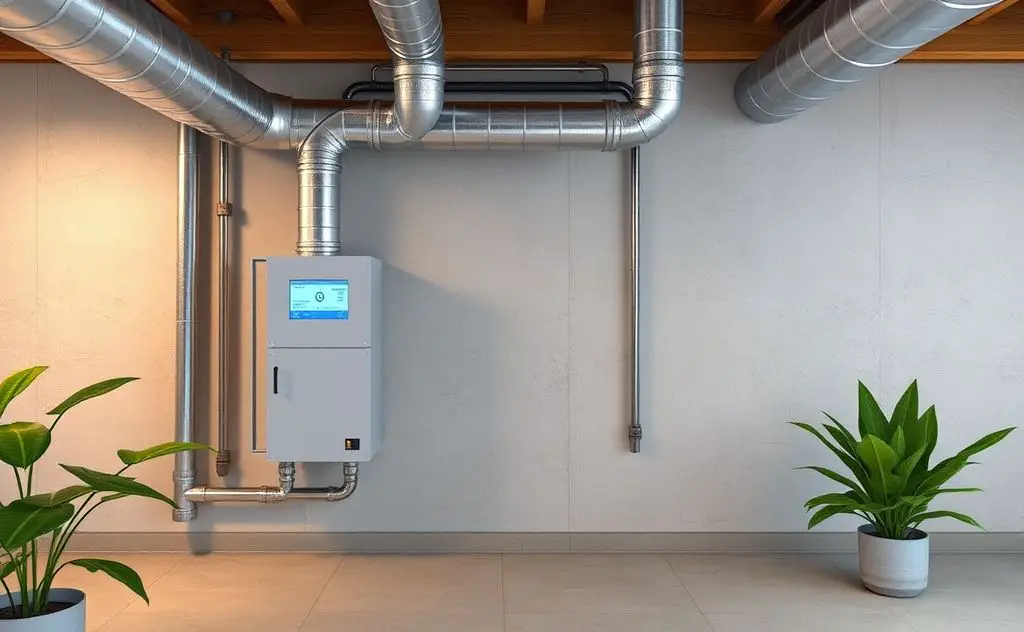HVAC systems regulate indoor humidity by controlling temperature and airflow, helping to maintain comfort and prevent mold growth.
Your HVAC system does more than just heat and cool air – it plays a critical role in managing indoor humidity levels. Proper humidity control affects comfort, health, and even your energy bills. This guide explains exactly how HVAC impacts humidity and what you can do to optimize performance.

The Science Behind HVAC and Humidity Control
HVAC systems manage humidity through two primary mechanisms:
- Cooling: As warm air passes over cold evaporator coils, moisture condenses into water and drains away
- Heating: Warming air reduces relative humidity (though absolute moisture content stays the same)
According to Department of Energy research, a properly functioning AC should remove 5-7 gallons of water per day from your home’s air.
Ideal Humidity Levels
The EPA recommends maintaining indoor humidity between 30-50% for optimal comfort and health. Levels above 60% promote mold growth, while below 30% can cause dry skin and respiratory irritation.

Common HVAC Humidity Problems
Oversized AC Units
An oversized system cools too quickly, shutting off before removing adequate moisture. This creates a cold but clammy environment. Proper system sizing is crucial for effective dehumidification.
Short Cycling
Frequent on/off cycles prevent the system from running long enough to dehumidify properly. This often occurs with:
- Oversized equipment
- Poor thermostat placement
- Dirty filters or coils
Ductwork Issues
Leaky ducts can introduce humid outdoor air while conditioned air escapes. Sealing and insulating ducts improves both humidity control and energy efficiency.
Advanced Humidity Control Solutions
Variable Speed Systems
Modern variable-speed HVAC systems adjust output to match needs, running longer at lower speeds for better dehumidification. These systems maintain more consistent humidity levels than single-stage units.
Standalone Dehumidifiers
For problem areas like basements, combination dehumidifier/heater units can supplement your HVAC system. Whole-house dehumidifiers integrate directly with ductwork.
Smart Thermostats
Advanced thermostats like Ecobee or Nest monitor humidity and can adjust system operation to maintain ideal levels. Some models even learn your preferences over time.
Maintenance for Optimal Humidity Control
| Maintenance Task | Frequency | Humidity Impact |
|---|---|---|
| Filter Replacement | Every 1-3 months | Clean filters allow proper airflow for dehumidification |
| Coil Cleaning | Annually | Dirty coils reduce condensation efficiency |
| Drain Line Inspection | Seasonally | Clogged drains prevent proper moisture removal |
As noted by ASHRAE research, regular maintenance can improve dehumidification performance by up to 30%.
Special Considerations for Different Climates
Humid Climates
In coastal or tropical areas, consider:
- Dedicated dehumidification systems
- Lower thermostat settings (72-74°F) for better moisture removal
- Ventilation systems with heat recovery
Dry Climates
In arid regions, you may need to:
- Add whole-house humidifiers
- Use evaporative coolers carefully
- Monitor for excessive dryness in winter
Signs Your HVAC Isn’t Controlling Humidity Properly
Watch for these indicators of humidity problems:
- Condensation on windows
- Musty odors
- Mold growth in corners or closets
- Static electricity shocks
- Warping wood furniture or floors
If you notice these issues, have your HVAC system evaluated by a professional. Proper humidity control protects both your home and health while improving energy efficiency.
